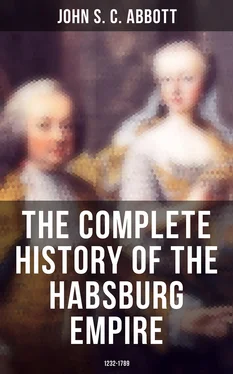John S. C. Abbott
The Complete History of the Habsburg Empire: 1232-1789
The Rise and the Decline of the Great European Dynasty
Published by
 Books
Books
Advanced Digital Solutions & High-Quality eBook Formatting
musaicumbooks@okpublishing.info2018 OK Publishing ISBN 978-80-272-4021-0
PREFACE PREFACE Table of Contents The studies of the author of this work, for the last ten years, in writing the "History of Napoleon Bonaparte," and "The French Revolution of 1789," have necessarily made him quite familiar with the monarchies of Europe. He has met with so much that was strange and romantic in their career, that he has been interested to undertake, as it were, a biography of the Monarchies of Continental Europe—their birth, education, exploits, progress and present condition. He has commenced with Austria. There are abundant materials for this work. The Life of Austria embraces all that is wild and wonderful in history; her early struggles for aggrandizement—the fierce strife with the Turks, as wave after wave of Moslem invasion rolled up the Danube—the long conflicts and bloody persecutions of the Reformation—the thirty years' religious war—the meteoric career of Gustavus Adolphus and Charles XII. shooting athwart the lurid storms of battle—the intrigues of Popes—the enormous pride, power and encroachments of Louis XIV.—the warfare of the Spanish succession and the Polish dismemberment—all these events combine in a sublime tragedy which fiction may in vain attempt to parallel. It is affecting to observe in the history of Germany, through what woes humanity has passed in attaining even its present position of civilization. It is to be hoped that the human family may never again suffer what it has already endured. We shall be indeed insane if we do not gain some wisdom from the struggles and the calamities of those who have gone before us. The narrative of the career of the Austrian Empire, must, by contrast, excite emotions of gratitude in every American bosom. Our lines have fallen to us in pleasant places; we have a goodly heritage. It is the author's intention soon to issue, as the second of this series, the History of the Empire of Russia. JOHN S. C. ABBOTT. Brunswick, Maine, 1859.
CHAPTER I. RHODOLPH OF HAPSBURG. From 1232 to 1291.
CHAPTER II. REIGNS OF ALBERT I, FREDERIC, ALBERT AND OTHO. From 1291 to 1347.
CHAPTER III. RHODOLPH II., ALBERT IV. AND ALBERT V. From 1339 to 1437.
CHAPTER IV. ALBERT, LADISLAUS AND FREDERIC. From 1440 to 1489.
CHAPTER V. THE EMPERORS FREDERIC II. AND MAXIMILIAN I. From 1477 to 1500.
CHAPTER VI. MAXIMILIAN I. From 1500 to 1519.
CHAPTER VII. CHARLES V. AND THE REFORMATION. From 1519 to 1531.
CHAPTER VIII. CHARLES V. AND THE REFORMATION. From 1531 to 1552.
CHAPTER IX. CHARLES V. AND THE TURKISH WARS. From 1552 to 1555.
CHAPTER X. FERDINAND I.—HIS WARS AND INTRIGUES. From 1555 To 1562.
CHAPTER XI. DEATH OF FERDINAND I.—ACCESSION OF MAXIMILIAN II. From 1562 to 1576.
CHAPTER XII. CHARACTER OF MAXIMILIAN II.—SUCCESSION OF RHODOLPH III. From 1576 to 1604.
CHAPTER XIII. RHODOLPH III. AND MATTHIAS. From 1604 to 1609.
CHAPTER XIV. RHODOLPH III. AND MATTHIAS. From 1609 to 1612.
CHAPTER XV. MATTHIAS. From 1612 to 1619.
CHAPTER XVI. FERDINAND II. From 1619 to 1621.
CHAPTER XVII. FERDINAND II. From 1621 to 1629.
CHAPTER XVIII. FERDINAND II. AND GUSTAVUS ADOLPHUS. From 1629 to 1632.
CHAPTER XIX. FERDINAND II., FERDINAND III. AND LEOPOLD I From 1632 to 1662.
CHAPTER XX. LEOPOLD I. From 1662 to 1697.
CHAPTER XXI. LEOPOLD I. AND THE SPANISH SUCCESSION. From 1697 to 1710.
CHAPTER XXII. JOSEPH I. AND CHARLES VI. From 1710 to 1717.
CHAPTER XXIII. CHARLES VI. From 1716 to 1727.
CHAPTER XXIV. CHARLES VI. AND THE POLISH WAR. From 1727 to 1735.
CHAPTER XXV. CHARLES VI. AND THE TURKISH WAR RENEWED. From 1735 to 1730.
CHAPTER XXVI. MARIA THERESA. From 1739 to 1741.
CHAPTER XXVII. MARIA THERESA. From 1741 to 1743.
CHAPTER XXVIII. MARIA THERESA. From 1743 to 1748.
CHAPTER XXIX. MARIA THERESA. From 1748 to 1759.
CHAPTER XXX. MARIA THERESA. From 1759 to 1780.
CHAPTER XXXI. JOSEPH II. AND LEOPOLD II. From 1780 to 1792.
Table of Contents
The studies of the author of this work, for the last ten years, in writing the "History of Napoleon Bonaparte," and "The French Revolution of 1789," have necessarily made him quite familiar with the monarchies of Europe. He has met with so much that was strange and romantic in their career, that he has been interested to undertake, as it were, a biography of the Monarchies of Continental Europe—their birth, education, exploits, progress and present condition. He has commenced with Austria.
There are abundant materials for this work. The Life of Austria embraces all that is wild and wonderful in history; her early struggles for aggrandizement—the fierce strife with the Turks, as wave after wave of Moslem invasion rolled up the Danube—the long conflicts and bloody persecutions of the Reformation—the thirty years' religious war—the meteoric career of Gustavus Adolphus and Charles XII. shooting athwart the lurid storms of battle—the intrigues of Popes—the enormous pride, power and encroachments of Louis XIV.—the warfare of the Spanish succession and the Polish dismemberment—all these events combine in a sublime tragedy which fiction may in vain attempt to parallel.
It is affecting to observe in the history of Germany, through what woes humanity has passed in attaining even its present position of civilization. It is to be hoped that the human family may never again suffer what it has already endured. We shall be indeed insane if we do not gain some wisdom from the struggles and the calamities of those who have gone before us. The narrative of the career of the Austrian Empire, must, by contrast, excite emotions of gratitude in every American bosom. Our lines have fallen to us in pleasant places; we have a goodly heritage.
It is the author's intention soon to issue, as the second of this series, the History of the Empire of Russia.
JOHN S. C. ABBOTT.
Brunswick, Maine, 1859.
CHAPTER I.
RHODOLPH OF HAPSBURG.
From 1232 to 1291.
Table of Contents
Hawk's Castle.—Albert, Count of Hapsburg.—Rhodolph of Hapsburg.—His Marriage and Estates.—Excommunication and its Results.—His Principles of Honor.—A Confederacy of Barons.—Their Route.—Rhodolph's Election as Emperor of Germany.—The Bishop's Warning.—Dissatisfaction at the Result of the Election.—Advantages Accruing from the Possession of an Interesting Family.—Conquest.—Ottocar Acknowledges the Emperor; yet breaks his Oath of Allegiance.—Gathering Clouds.—Wonderful Escape.—Victory of Rhodolph.—His Reforms.
In the small canton of Aargau, in Switzerland, on a rocky bluff of the Wulpelsberg, there still remains an old baronial castle, called Hapsburg, or Hawk's Castle. It was reared in the eleventh century, and was occupied by a succession of warlike barons, who have left nothing to distinguish themselves from the feudal lords whose castles, at that period, frowned upon almost every eminence of Europe. In the year 1232 this castle was occupied by Albert, fourth Count of Hapsburg. He had acquired some little reputation for military prowess, the only reputation any one could acquire in that dark age, and became ambitious of winning new laurels in the war with the infidels in the holy land. Religious fanaticism and military ambition were then the two great powers which ruled the human soul.
Читать дальше

 Books
Books










